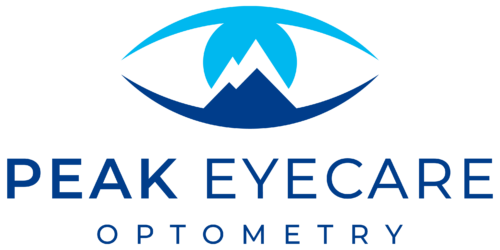
Eye doctor in Santa Clarita, California
Dry eye disease can develop as a result of several factors, such as age, genetics, environment, lifestyle, medications, and overall ocular health.
Any of these may prevent you from producing sufficient tears, or may lead you to produce tears whose balance of water, lipids, and mucus aren’t sufficient to lubricate your eyes properly.
Fortunately, this condition can be successfully treated. If you think you may have dry eye syndrome, contact Peak Eyecare Optometry today. We will offer you a proper evaluation and provide you with the best options to treat your DES.
Q: Are some people more prone to having Dry Eyes than others?
- A: Yes. Generally those that suffer with allergies, or have systemic inflammatory diseases like arthritis and sjogrens’, or those who use the computer or digital devices often and even contact lens wearers tend to be more susceptible to dry eye symptoms.
Quality Frames for Prescription Eyeglasses & Computer Glasses. Visit Peak Eyecare Optometry for an eye exam and eyeglasses that match your style.
Dry Eye May Develop As a Result of...
Meibomian Gland Dysfunction (MGD)
Meibomian gland dysfunction (MGD) accounts for the majority of dry eye cases. It results when an abnormality or blockage occurs in the small meibomian glands, located in your lower eyelid. As a result, the tiny glands are unable to produce the lipids needed to maintain the right balance for the optimum quality and functioning of the tears. A shortage of these lipids can cause the tears in your eyes to evaporate too quickly, resulting in dry eyes.
Blepharitis
Blepharitis is an inflammation of the eyelids. The affected area is usually at the very end of the eyelid, located at the base of the eyelashes. This inflammation causes the tips of the eyelid to swell up, appear red and inflamed, and produce infected debris called scurf. If you think you may be suffering from this eye condition, contact us today.
Certain medical procedures
Complications from certain medical procedures, such as eye surgery and radiation therapy, will very often result in DES. Radiation therapy to treat head and neck cancers, cancer of the eye socket or whole brain radiation for brain cancer, often damages the lacrimal glands. The glands may decrease tear production and cause dry eye symptoms.
This is also true for laser eye surgery, such as LASIK, where DES symptoms may develop due to an increased corneal sensitivity following the surgery.
Cataract surgery does not typically worsen dry eyes, as only two very small incisions, less than 2mm each, are made in the cornea during this operation. However, many eye doctors will assess and treat dry eyes prior to cataract surgery, as a pre-existing dry eye condition can sometimes influence the accuracy of measurements, affecting quality of the vision following the surgery.


Diabetes
Diabetes can lead to dry eyes because of nerve neuropathy. Essentially, the nerves that control the tear ducts may stop functioning properly, resulting in decreased tear production. Furthermore, diabetes can cause loss of corneal sensitivity, which also impacts dry eye syndrome.
Sjogren's Syndrome
This is an autoimmune disease that can affect the nerves and prevent the tear ducts from producing a sufficient volume of tears.
Thyroid disorder
The thyroid maintains the body’s hormonal and metabolic balance. A malfunctioning thyroid alters the metabolism of the entire body — and your eyes are no exception. Both overactive and underactive thyroid conditions can result in dry eyes.
Certain medications
Several medications may cause a reduction in the functionality of tear ducts and lead to dry eyes. These include:
- Diuretics
- Decongestants
- Antihistamines
- Anticholinergics
- Antidepressants
- Hormones
- Hypertension medication
- Dermatological agents
- Lortab (acetaminophen and hydrocodone)
- Ibuprofen (Advil)
Please inform us of any medications you are taking, whether over-the-counter or prescription meds, as this will enable us to better assess and treat your dry eye condition.
Hormonal changes
Sharp changes in your body’s hormone levels will often result in an inflammatory response that can result in dry, irritated eyes.
- Pregnancy - Blurred vision, itchiness, burning, or discomfort when wearing contact lenses, as well as sensitivity to light may occur during the early stages of pregnancy, when hormones are most active. These hormones may also adversely impact meibomian glands, located within the upper and lower eyelid margins.
Healthy glands secrete oil to prevent tear film evaporation. However, malfunctioning meibomian glands may cause your tears to evaporate more quickly, resulting in unstable tear film and dry eye. The condition can last throughout the pregnancy, during postpartum recovery, and even throughout the breastfeeding phase.
- Birth control - The pill, hormonal patches, vaginal rings or IUDs may cause similar hormonal changes as those found during pregnancy, thus resulting in decreased tear production. Producing fewer tears increases the likelihood of developing dry eyes.
- Menopause - When undergoing menopause, the body produces less progesterone, estrogen, and androgens. The latest research indicates that androgens directly affect the delicate balance of tear production, meaning that fewer androgens will result in fewer tears.
Managing dry eye syndrome in menopausal women requires a customized treatment plan.
Contact us today to book an appointment with Dr. Harrison Tsang, who will provide you with the most effective treatment for your specific case of dry eye.


Seasonal changes Seasonal changes — particularly in the spring, summer, and fall— cause an increase in pollens and allergens in the air. Certain people develop an autoimmune response to these allergens, which frequently results in ocular inflammation and dry eyes.
Wind and dryness
Dry climates tend to have high winds and little moisture in the air, which can cause the tears to evaporate quickly.
Indoor heating systems
Cold weather may lead you to spend most of your time indoors, exposed to dry heat. This can evaporate your tears, leading to inflamed, itchy eyes.
Reduced blinking when using digital devices
People tend to blink 66% less when staring at a digital device, and whatever blinking is done is only partial — which isn't as effective at keeping the eyes moist. Making a conscious effort to blink more often can prevent dryness and irritation.
Contact lenses
People who wear traditional contact lenses often complain of dry eye symptoms. These symptoms can be exacerbated by improper contact lens hygiene or by over-wearing the contacts . Those with an underlying dry eye condition should consider specialized contact lenses.
Eye infections
Eye infections, such as viral or bacterial conjunctivitis (or pink eye), can cause significant irritation, similar to that of dry eye syndrome. The symptoms will usually clear up once the infection has been treated.
Omega 3
Omega 3 fatty acids can improve the eye's oil film that's produced by small glands on the edge of the eyelid, called the meibomian glands. These fatty acids are essential for tear production and to ease stinging, irritation, and scratchy sensations that often occur with dry eyes.
If your diet is low in Omega 3, you should consider adding more fish to your diet or taking supplements as needed. Dr. Harrison Tsang will be more than happy to guide you to the supplements that provide the best sourcing and bio-available Omega 3.
You don’t have to suffer from dry eyes in silence. At Peak Eyecare Optometry, Dr. Harrison Tsang will conduct a full assessment and develop a custom treatment plan that’s right for you.

